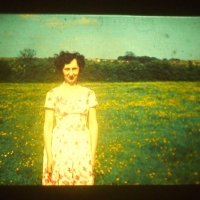'Very Well' by Batsch
Review
I might as well immediately acknowledge the elephant in this reviewing room: I find trying to locate suitable words to describe Batsch's music a challenge. I've kind of managed to finesse my way through lately as their songs have come one at a time but with the arrival of the new album ‘Very Well', I'm presented with eight at once.
"Knew No Different", "Golden Summer" and "Too Few" are amongst those & are in fact the singles I was just talking about: here in remastered form. They are joined by "The Good Day", "Very Well" itself, "Big Wave", "Love of Colour" and "Slick-Slack".
I'm going to have to construct a conceptual framework to support me through so much material which almost defies description: so here goes.
I've always maintained my belief in Batsch's pivotal role in pioneering a particular strand of melodic experimentalism in local music which has encouraged some spectacular outcomes from successive artists.
I'm now going to advance a further theory that they partly try to paint sound pictures which correspond to visuals they have in their minds. The evidence: well firstly the striking abstracts which grace the singles & this album courtesy of Maximilian Rhodes and secondly that for their album launch later today at The Tin they not only have musical support from Project Overload but also "mind-melting" visuals by Glitched Liquid.
In this reading, I'm nominating "Love of Colour" therefore as the key track.
It also accounts, in my opinion for much of what we hear.
Mason Le Long & Matt Rheeston can be described (well that's what I'm about to do anyway) as painting the most pleasing yet intricate pieces using a wide range of conventional & electronic instruments plus what I take to be samples.
That they have a firm plan for each track is evident: the alternative would be an orgy of self-indulgence resulting in long overblown pieces of little meaning despite the form. I hear discipline and hard work put into fulfilling the initial vision: and of course the proof is that they can play them live. None is excessively long which again shows that restraint and tight editing.
The palettes the two of them have at their disposal are very large ones. When you watch them reproduce this material on stage, the amount of kit is most impressive but it's not like the bombast of the most excessive 1970s prog rock: you see Mason with a guitar & a keyboard plus various mysterious boxes & these let him express himself without the need for banks of keyboards not multiple guitars: let alone ones with many necks. Equally Matt uses a restrained kit without hordes of extraneous toms or cymbals (or bass drums): though once again pads & boxes are key to keeping the multiplicity of kit discrete in size while keeping aural options to the maximum.
Technological advances have been enabling to Batsch in this respect I'm sure though it must have been something of an epiphany when they realised that Batsch slimming down to a duo from the original quartet wasn't actually going to be a functional problem in the least.
The approach certainly benefits from this vast range of sounds they can actually use if they want to, but the temptation to overindulge & use all of them on every track (I think we all know bands led down that particular path) is kept in check by their taste. It's all about nuanced sounds and much of the time I think the idea of finding the right texture is far more important to them than grabbing you by the throat with some unexpected & trite musical surprise. Passages flow neatly into each other like classical ones.
All this discourse serves to put off the moment when I do what a reviewer is supposed to and (a) describe the music and (b) tell you what the songs are about.
Which are hard challenges with Batsch. I'm inclined to suggest that abstraction is important to what they write about: although songs like "Golden Summer" (as I discussed in my review when it came out) had their roots in relatively easily described ideas, by the time Batsch have finished with them, they've developed into far more complex & intellectually challenging pieces. This value added process leaves the original inspiration intact in there somewhere but with plenty of associations deriving from it to trigger new and original responses of your own.
The general impression I was left with was very positive: one of benevolence if not optimism. This however does not mean that the intricate web of the songs is woven from a single colour yarn: some definitely start from a position of some form of scepticism about aspects of the world yet eventually tend to resolve to ways of reconciling with them.
"Alas" say Batsch "the world is far from perfect but let's find something good in there if possible". Or so I imagine their Weltanschauung. To me, their attempts to process humanity bear equivalence to mine with their music. Not easy but ultimately the more rewarding.
You might read the album title in two ways: either as an affirmation of where they find themselves or as a gesture of acceptance that the above strategy is the best one for them.
Or if philosophy in songs isn't what attracts you to them, you could simply dance to them & quite plausibly that route also takes you to the same end.
As you may know, Batsch have been working closely with Duke Keats in recent years and it shows on this album. I have no intention whatsoever of trying to trace any sense of influence between the parties but let's say there is substantial convergence. Had someone played me "Slick-Slack" and told me it was a Duke track, I shouldn't have doubted them.
As part of this, it's worth pointing out that funkiness is something the band slip into the twisted melodicism but it's a delightfully British take: a rather polite and well-behaved version. There is no cultural appropriation here. If it nods tribute to Sly for example, it doesn't steal any more than the infectious Afro-Latin crossover "Big Wave" (in which unfortunately they seem to be having a rather disillusioned time in the middle of a vibrant carnival) does from its various sources.
There is a regrettable tendency within reviewing to peer so closely at tracks and even try to break them down that the glory of the whole is missed (a "wood for trees" type scenario if you will). Batsch will not have created these songs in order to pose us problems to somehow decode and "solve". They will be intended as holistic artefacts to be enjoyed for what they are, which is to say as well, more than a sum of whatever parts one can discern and pick out. That really is the level of respect we need to be paying them.
As Keats said, "a thing of beauty is a joy forever" and he knew a lot about art, what it says through its overt visuals, words and sounds and what it leaves unsaid for your mind and your imagination to complete.









